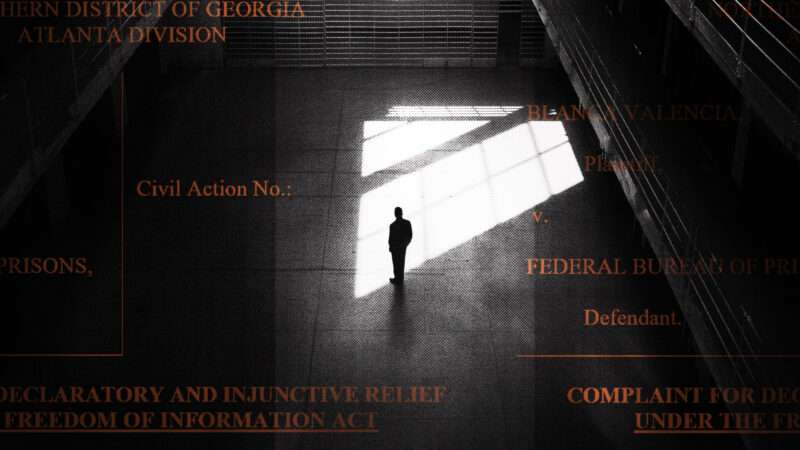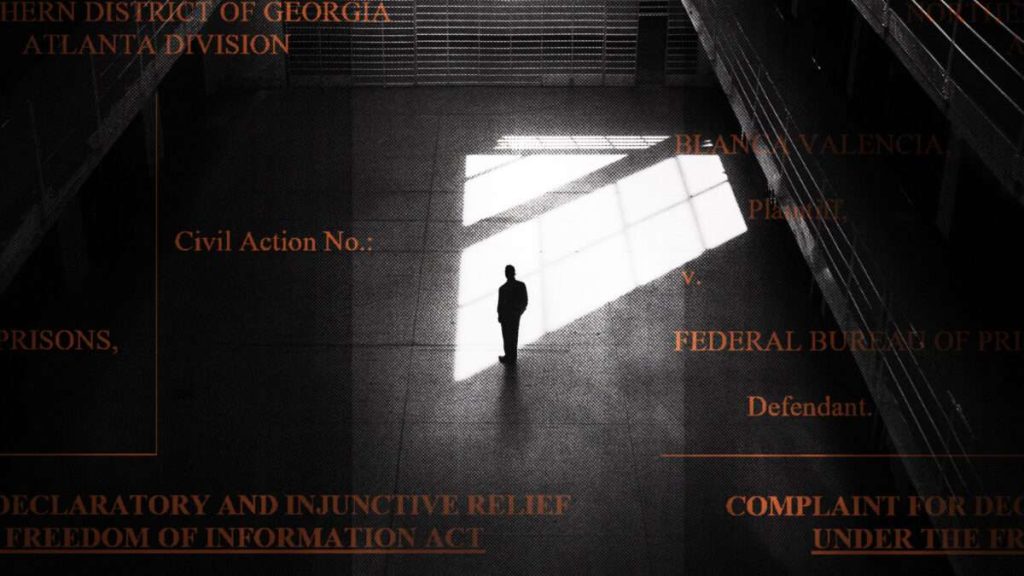
On June 13, 2019, Mandy Turner received the call every family member of someone in prison dreads. Her little brother, Frederick Turner, had been found dead in his cell in a federal high-security lockup in Colorado. He was a first-time offender and terrified of the violent, gang-ridden prison he’d been sent to.
But it’s what Bureau of Prisons (BOP) officials told her next that still haunts her: nothing.
Her little brother’s case manager said the prison would have more information the next day, but for the following five days, Turner and her sister frantically called the prison, both to find out what happened and to prevent his body from being cremated, only to be ignored. She says she eventually learned their calls were being screened.
“That is the most brutal phone call you can get in your life,” Turner says. “And then nobody can tell you anything. For the prison to completely cut off communication with us when we called—they actually said, if they’re asking about Frederick Turner’s case, do not talk—the thing that it made us feel is what the hell are they hiding? How can we find peace?”
When Turner’s family finally received his death certificate several weeks later, they were flabbergasted. It listed his cause of death as complications from an appendix removal. Turner never had his appendix removed, inside or outside of prison. The BOP would later reclassify Turner’s death as a suicide, but doubts and questions nag his sister to this day.
What Mandy Turner experienced is not unusual. Interviews with the families of people who die in federal prison show a remarkably consistent cruelty by BOP officials toward them during the worst moments of their lives.
Families describe delays in being notified that their incarcerated loved one had been hospitalized, or even died; having their phone calls ignored; not being allowed to see their loved one in their final moments; delays in being sent the body and death certificate; being given inaccurate or incomplete information about the manner of death; or waiting months and years for the Bureau to fulfill their public records requests for more information about how their loved one died.
“Generally when it comes to information about the wellbeing of people in the care and custody of the Bureau of Prisons, the Bureau of Prisons’ first response is always to provide as little information as possible,” says attorney Alison Guernsey, director of the Iowa College of Law’s Federal Criminal Defense Clinic.
NPR reported in January that the BOP was misclassifying deaths as “natural,” which prevents further investigation and leaves families in the dark about what really happened.
“An inmate in Arkansas complained of stomach pain for a year and a half before his death,” NPR reported. “His family was not provided with any more details. Another inmate in Missouri died of respiratory failure, and his death was pronounced natural. But according to medical examiner records obtained by NPR, his death was later treated as a homicide. His family found out about this information for the first time from NPR.”
The BOP declined to comment on this story, but it did provide the agency’s official policies regarding hospitalizations and deaths. According to BOP policy, the warden or other designee should telephone the deceased inmate’s next-of-kin “immediately to communicate the circumstances surrounding the death.” The policy also states that the warden should draft a letter of condolence explaining the nature and causes of death.
But families, lawyers, and criminal justice advocates say the BOP is shirking both its policy and its moral duty to give a bare minimum of courtesy to families.
Blanca Valencia’s son, Anthony Maseda, was incarcerated at FCC Coleman, a federal prison complex in Florida, before he died on March 12. He was a 22-year-old with Type 1 diabetes.
“He was always complaining about how his blood sugars were always high, and they didn’t listen to him, nobody would pay attention to him,” Valencia says. “I remember he called me one day and he told me, ‘Mom, I’ve been really sick, but I feel a little bit better today.’ And then he stopped calling me out of nowhere. They called me from the hospital a week, maybe two weeks later, saying that he was at the hospital really, really sick, and that he was probably not gonna make it.”
Families frequently say the BOP fails to notify them when their loved ones are hospitalized. In 2020, a father of an incarcerated woman told Reason the BOP never informed him that his daughter had been in a coma for more than a week.
“We were emailing every day, and all of a sudden the emails stopped,” the father wrote. “I didn’t know what was going on for about a week. Ten days later I got a letter from one of the people she was incarcerated with that told me what happened.”
Valencia, who lived in Georgia, says she was only able to visit her son in the hospital twice because of the distance. He was handcuffed to the bed, despite being in a coma, and she says his wrists were swollen from the cuffs. She says BOP officials wouldn’t let her ask doctors questions, nor would they allow her to stay.
According to the BOP’s official policy: “An inmate’s serious illness is of immediate concern to the inmate’s family; the institution will notify the next of kin promptly. If approved by the Warden, the immediate family member (next of kin) will be made aware of the medical condition and the limitations placed on visiting. While the Bureau will continue to control conditions under which a family member may visit, consideration will be given to providing the maximum opportunity for visitation.”
Guernsey recalls a similar case where she had to fight to get the BOP to allow a family to visit a federal inmate who was hospitalized and in a coma.
“I’ll tell you the process to get family members into the room with him and to have the Bureau of Prisons clarify who in fact had decision making authority over him was truly difficult,” Guernsey says. “And I don’t know that the family would’ve been able to navigate it without lawyers.”
Valencia did not have a lawyer. “He stayed suffering in there for like two months, and then suddenly he passed away,” she says of her son, choking back sobs. “I saw him on a Sunday, and then passed away on a Tuesday. He was alone when he passed. They didn’t let me stay with him.”
As for an official condolence letter, Valencia says she never got one about her son’s death. “This is a lie,” Valencia texted when sent the BOP policy. “They never sent anything to me.”
The BOP listed Maseda’s official cause of death as complications from influenza, which is an atypical medical outcome for a 22-year-old man.
Guernsey says it’s not unusual for the BOP to misstate the cause of death to families. She studied federal inmate deaths during the COVID-19 pandemic, and she kept running into cases where she knew more about what happened than next of kin.
“I was increasingly surprised by the number of families who had been told one thing by the Bureau of Prisons, and yet the publicly reported information or the FOIA’d information revealed something else,” Guernsey says.
Vanessa Washington’s son, Shawn Melendez, also died at FCC Coleman. On July 25, 2023, Washington received the dreaded phone call. Melendez had been found dead in his solitary confinement cell. The BOP listed Melendez’s cause of death as fentanyl overdose, which never sat right with Washington.
“It’s one thing for him to have a habit in general population, where he has access to everything, but to overdose in solitary confinement, it’s just unbelievable,” Washington says. “It shouldn’t have happened.”
Washington says the process of getting the BOP to send her son’s remains back was “grueling.”
“It took them 10 days to finally do the right paperwork to have Shawn sent to us,” she says. Her experience is also not unusual.
Valencia says it took roughly two weeks for the BOP to return Maseda’s body to her, because, she was later told, the official who was responsible for filling out the paperwork had gone on vacation.
Mary Price, the general counsel of the criminal justice advocacy group FAMM, recalls one case she worked on where a judge granted compassionate release to an incarcerated individual who had been hospitalized. The person died the next day, and Price says the BOP took the position that since the individual was no longer in its custody at the time of death, the agency wasn’t obligated to ship the body back to the next-of-kin.
Price says she had to call the BOP central office and explain that the family couldn’t afford it.
“Eventually [the BOP] did return the body—in a body bag, not in a casket, which was just like one additional slap in the face of the grieving family,” she says. “It was really infuriating.”
“When an individual dies away from home, in custody, the least their survivors should be able to expect is prompt and kind notification,” Price says. “And I think that there’s really no guarantee of either when that person dies in federal Bureau of Prisons custody.”
For example, Kesha Jackson’s husband, John Jackson, died at low-security federal prison in Arkansas in 2019. On that day Kesha Jackson received a call from John’s sister, who said she needed to call the prison right away; something had happened and they wouldn’t tell the sister anything.
“I did not get through,” Jackson said in a video produced by FAMM. “The phone just rang and rang.”
The Bureau of Prisons did not have the time to call Jackson or even answer the phone, but it did have time to update its website.
“John’s other cellmate, who had gone home, called and said, ‘Kesh, look at the federal inmate locator,'” Jackson recalled, “and they had updated it to say ‘deceased.'” A chaplain would call her several hours later to break the news she’d already learned.
Another inmate told Jackson her husband had been slipping in and out of consciousness in his cell. Other inmates banged on their doors to try and alert someone, but correctional officers wouldn’t come. When the guards finally opened Jackson’s door and dragged him out, he was already dead. His cause of death was listed as MRSA, a severe but treatable staph infection.
“Had he had help at the beginning, then he probably would not have passed away,” Kesha Jackson said. “I continue to live this over and over in my head. The sad part is I’m a licensed therapist and the things I would tell my clients aren’t serving me.”
And then there is the issue of public records. The federal Freedom of Information Act (FOIA) is supposed to guarantee prompt access to government records, but it’s broken. Families who request prison and medical records wait months, often years, to receive them.
Turner says she waited three years for FOIA records on her brother Frederick’s death.
“I submitted letters indicating they could release my son’s information over and over,” Washington says. “I just kept getting led to a dead end. I called, I left emails, I wrote certified letters to these people, and no one ever responded. No one ever responded at all.”
The only way to get the BOP’s attention is to sue it. James Slater, an attorney based in Florida, has filed three FOIA lawsuits on behalf of six families whose loved ones died in the BOP system, including the families of Anthony Maseda and Shawn Melendez. He says it’s an “unacceptable reality that the only way families are able to understand what happened to their loved ones within the time frame to right any wrong is through a FOIA lawsuit.”
“The federal penal system rarely provides timely answers to families seeking to understand why their loved ones died in prison,” Slater says. “Because of this, we are now routinely suing the Bureau of Prisons under the Freedom of Information Act to compel it to comply with the law and provide information to loved ones.”
The long delays in turning over FOIA records not only leaves families in the dark but hurts their chances of seeking justice. There’s a two-year statute of limitations for lawsuits against the government, meaning that those months of FOIA delays eat into families’ time to retain legal counsel and prepare a suit, because an attorney typically won’t take a negligent death case without seeing those records first.
“I’m searching for an attorney to take my son’s case with only maybe 10 months left before the statutory limit,” Washington says.
What all of this adds up to, families say, is a never-ending punishment that was never signed off on by a judge.
“To never know what really happened to my little brother is a life sentence for us,” Turner says. “To this day we don’t know.”
The post The Bureau of Prisons’ Casual Cruelty to Families of Those Who Die Behind Bars appeared first on Reason.com.





